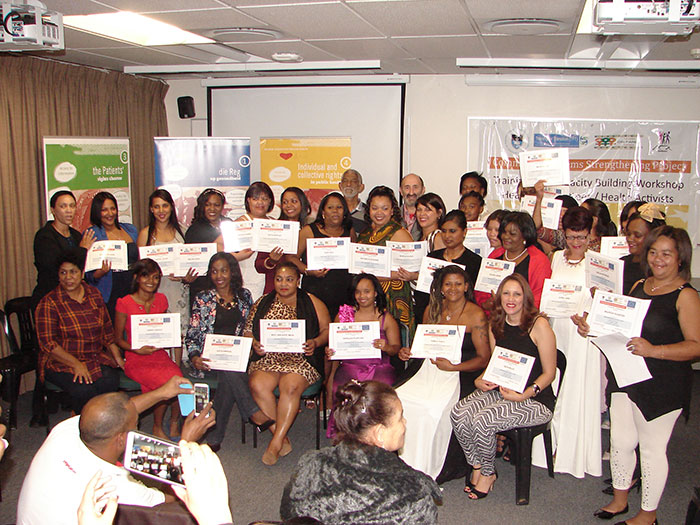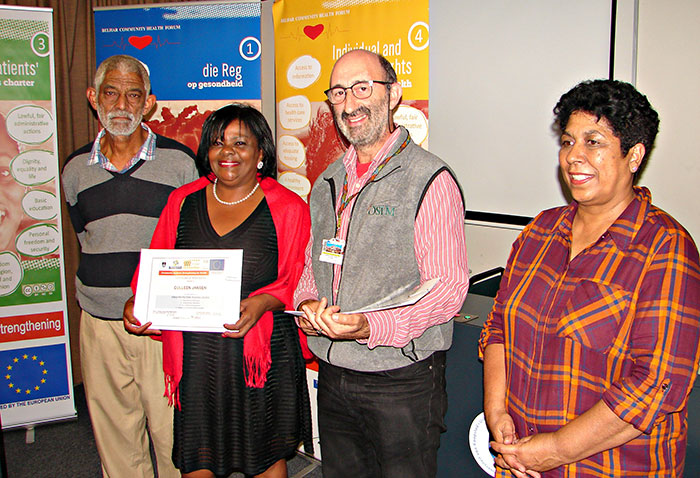Public health project empowers communities to address their needs


Communities in South Africa are beset by multiple social problems that affect health. People struggle to find employment, children grow up in unsafe environments, food insecurity is rife, violence is pervasive and impacts on health and well-being, yet the service delivery needs at local government level are tremendous. A new partnership between UCT’s School of Public Health and Family Medicine (SPHFM), Training for Transition Training (TFT) Consultancy and Women on Farms Project aims to test a model for addressing both challenges by training local citizens to provide basic community health services as health activists.
Chronic illnesses and violent crimes such as rape and child abuse place severe strain on the health and social services sector resulting in long queues at health facilities and unmet demands for social services. To fill this gap, community members who might be without sufficient formal education, but with sufficient capability, are supported through a comprehensive training and mentoring process, to provide the skills that their communities need. Health committees, which are structures established by legislation to act as the interface between health services and the community, are being strengthened to play a leadership role at community level in addressing not just the quality of care in health facilities, but also to tackle the social determinants of health.

“UCT has committed itself to engaging with communities and doing research in a way we call ‘social responsive’ - research that responds to the needs of people,” says UCT Professor Leslie London, from SPHFM, who is leading the Community Systems Strengthening (CSS) project. The CSS is working with three different communities in Cape Town, Belhar, Gugulethu and Klapmuts to test the model.
The community of Belhar has a neighbourhood of 37 000 residents. There is no social worker or counselling service for victims of violent crimes, sexual abuse or domestic violence, which according to community members, is alarmingly high. Conducted in collaboration with the Belhar Community Health Forum, the CSS training covers an understanding of sexual violence, child protection, awareness-raising, access to food and nutrition and chronic illness.
“What sets this initiative apart is it is not just a vague notion of empowerment, we are teaching practical skills, we are taking community members without sufficient formal education and training them to be the professionals in the community providing the services that they have identified are lacking,” said Anita Marshall, Director of Training for Transition Training (TFT) Consultancy.
“We want to create a society where people use social development resources in order for communities to produce their own networks, reinforce their own skills and build a collective way of addressing local problems that is sustainable in the long term,” says Professor London.
The collaboration recently produced its first group of health activists who are now in the process of registering their services after which they will proceed to formal training. Participants felt empowered by becoming part of a circle of women who will create and advocate for prevention and supportive strategies for their community.
One of the participants, Colleen Jansen says, "Ever since I was a child and even through my adult years, I never thought that I would one day play such an important role as this."
In just a year of implementation the Belhar collaboration has produced results with some of the trainees initiating a child protection forum. Based on the outcomes of the research on the three sites, it is the hope of the partnership to present government with a model for addressing both unemployment and the urgent need for services.
“The CSS project highlights the School of Public Health and Family Medicine’s commitment to the concept of a healthy population having equitable access to resources and highly competent health care professionals to achieve a better quality of life,” says head of the Department of Public Health and Family Medicine, Prof Landon Myers.
“Our work is guided by values which include openness, social engagement, mutual respect, social justice and lifelong learning, and committed to engaging with health care providers, communities and agencies to protect, improve and promote family and public health in order to contribute towards just social development here and beyond our borders in Africa.”
The measure of this may be seen in the School of Public Health & Family Medicine’s recent ranking among the top 10% in the world by the Academic Ranking of the World’s Universities latest rankings in Public Health (40th among more than 400 institutions globally), based on excellence in teaching, research and service.